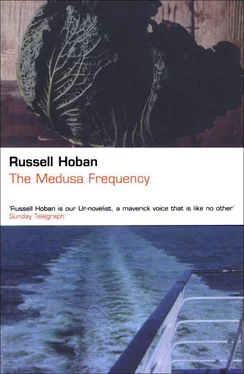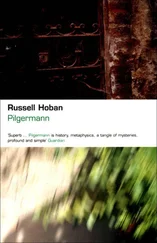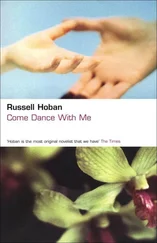‘All right, you believe that I’m the head of Orpheus. But do you believe that I’m real?’
‘Real how?’
‘Like the river, like the stones and the mud.’
‘I believe you’re real in your way.’
‘What way is that?’
‘You’re real in my mind; you’re a hallucination.’
‘Do you think I’ll go away if you stop thinking me?’
‘Yes, I do.’
‘And what if I stop thinking you?’
‘I think I’ll still be here.’
‘Let’s try it,’ said the head, and was gone; in my hands I held a slime-covered stone. There was a greyness all around me, a tightness across my chest, a heaviness coming to a point on each side of the base of my throat, the veins and arteries of my arms seemed filled with lead. The pain grew harder and heavier; I thought I was going to collapse there in the mud by the river. Then the head was back in my hands, the greyness and the pain receded.
‘That’s what happens if I stop thinking you,’ said the head of Orpheus. ‘Do you know what I am to you?’
‘Probably not.’
‘I am the first of your line. I am the first singer, the one who invented the lyre, the one to whom Hermes brought Eurydice and perpetual guilt. I am your progenitor, I am the endlessly voyaging sorrow that is always in you, I am that astonishment from which you write in those brief moments when you can write.’
‘Endlessly voyaging sorrow and astonishment. Yes, I have those from you, I know that. Perpetual guilt, you said.’
‘In the stories they always say I turned around to look at her too soon but that isn’t how it was: I turned away too soon, turned away before I’d ever looked long enough, before I’d ever fully perceived her.’
With those words there came into my mind Luise. Once when we were living together I was on a 22 bus and I saw her unexpectedly in Sloane Street. The bus was moving slowly north in heavy traffic and she was walking south. She was wearing a long black coat and as she approached she was smiling to herself and walking slowly, lingeringly, as if lost in thought. Then the bus passed her and I turned and saw her going away. After that I sometimes imagined her seen from a distance walking away slowly, lingeringly, not coming back.
‘Does anyone ever fully perceive anyone else?’ I said. I began to cry.
‘Cry on my face,’ said the head, ‘maybe my eyes will grow back.’
‘Is there healing in my tears?’
‘I don’t know, I’ll try anything.’
‘Maybe you ought to stop trying. You’re old, you’re blind and rotten, you can’t sing any more. Why don’t you just pack it in?’
‘I haven’t that choice, there’s no way for me to cease to be. I’m manifesting myself to you as a rotting head but there’s no picture for what I am: I am that which sings the world, I am the response that never dies. Fidelity is what’s wanted.’
‘Fidelity. I got my head zapped looking for a novel and here I am listening to homilies from a rotting head.’
‘You don’t know what you’re looking for,’ said the head. ‘Alone and blind and endlessly voyaging I think constantly of fidelity. Fidelity is a matter of perception; nobody is unfaithful to the sea or to mountains or to death: once recognized they fill the heart. In love or in terror or in loathing one responds to them with the true self; fidelity is not an act of the will: the soul is compelled by recognitions. Anyone who loves, anyone who perceives the other person fully can only be faithful, can never be unfaithful to the sea and the mountains and the death in that person, so pitiful and heroic is it to be a human being.’
Again I felt the pain across my chest and down my left arm. ‘If you’re going to take a high moral tone you’d better find someone else to talk to,’ I said, ‘I’m not up to it.’
‘Do you think about fidelity sometimes?’ said the head.
‘Sometimes.’ Years after Luise had gone I found inside a copy of Rilke’s Neue Gedichte her recipe for bread; I’d never seen her use a written-down recipe but there it was in her writing on a folded-up feint-ruled notebook page marking ‘Orpheus, Eurydike, Hermes’:
1·5 kg granary flour
2 dessertsp oil
1 ” salt
1 tblesp caraway seeds
2 ” dried yeast
1½ pts water, bloodwarm
1 teasp sugar
Put flour in a bowl, add oil & caraway seeds. Put sugar & yeast in a jug, add a little of the warm water. Leave for 10–15 mins in a warm place to froth, add salt to warm water. When yeast dissolved, add to the flour and water. Stir, then turn on to a floured board & knead 10–15 mins until it is elastic. Put back in bowl, cover, leave to rise in warm place. When doubled in size, take out, divide into 2, knead & thump, shape into loaves and put in greased tins. Cover, leave for 10 mins in a warm place, then put in oven & bake at 220° for 40-5 mins.
The smell of the brown loaves was like fidelity.
Luise had an accordion and she liked to play hymns on it. Her favourite was ‘Aus Tiefer Not’, ‘From Deep Distress’:
Aus tiefer Not schrei ich zu dir,
Herr Gott, erhör mein Rufen.
From deep distress cry I to thee,
Lord God, hear thou my calling.
This is Psalm 130, ‘De profundis’, and the Book of Common Prayer renders it:
Out of the deep have I called unto thee, O Lord:
Lord, hear my voice.
She sang it in German of course, in a deep and distant Thirty Years’ War soprano while the accordion marched on in a minor key like a troop of pikemen with dinted helmets. Luise’s mother had bought her the accordion and paid for the lessons; her father had died in the Ardennes in 1944.
She farted like a woman who carries a spear and drives a chariot. ‘What kind of piety is that?’ I said. ‘With your upper part you’re singing hymns and with your lower part you’re making Götterdämmerung. You’re making tiefe Not for the rest of the world.’
‘They can cry out to God the same as I do. The airwaves are free, it costs them nothing.’
‘Tell me more about your deep distress.’
‘With you everything comes out; with me it stays in, it’s deep, it’s nothing to talk about. Also it’s not uncomfortable, it’s like a mountain of stone and on top of it grows a little blue flower. Don’t worry about it.’
‘The mountain stays in but the bad air comes out.’
‘Inside I’m pure,’ she said.
‘Is there something else you wanted to talk about?’ I said to the head. ‘Or is fidelity the only thing on your mind at the moment?’
‘Do you want to hear my story?’ said the head.
‘Yes, I want to hear your story.’
‘I ask you for the second time: do you want to hear my story?’
‘Yes, please tell it.’
‘I’ll ask you three times: for the third time, do you want to hear my story?’
‘Yes, yes, yes. Three times yes. Now tell it.’
‘Once begun, the story must be finished.’
‘Well of course I want to hear the whole thing.’
‘You have to take it on you then, you have to say, “Once begun, the story must be finished; I take it on me.’”
‘Once begun, the story must be finished; I take it on me.’
‘Now I’ll begin,’ said the head. ‘I’m not very sure of anything; I may be lying or I may even be making it up as I go along. I was a good musician but I’m not reliable in any other way. Sometimes I can’t make the distinction between how things seemed and how they actually were.’
‘Who can?’
The head of Orpheus gave a little cough and seemed to pull itself together. ‘I don’t really want to tell my story,’ it said, ‘but I have to do it if I ask three times and you say yes each time. I’m not even sure what the story is. Have you ever, perhaps while walking, found the world coming towards you in all its detail and then receding behind you and nothing has any more significance than anything else: a stone in the road or the sun in your eyes or the black shape of a bird in the blue sky, you don’t know whether one thing matters more than another?’
Читать дальше












